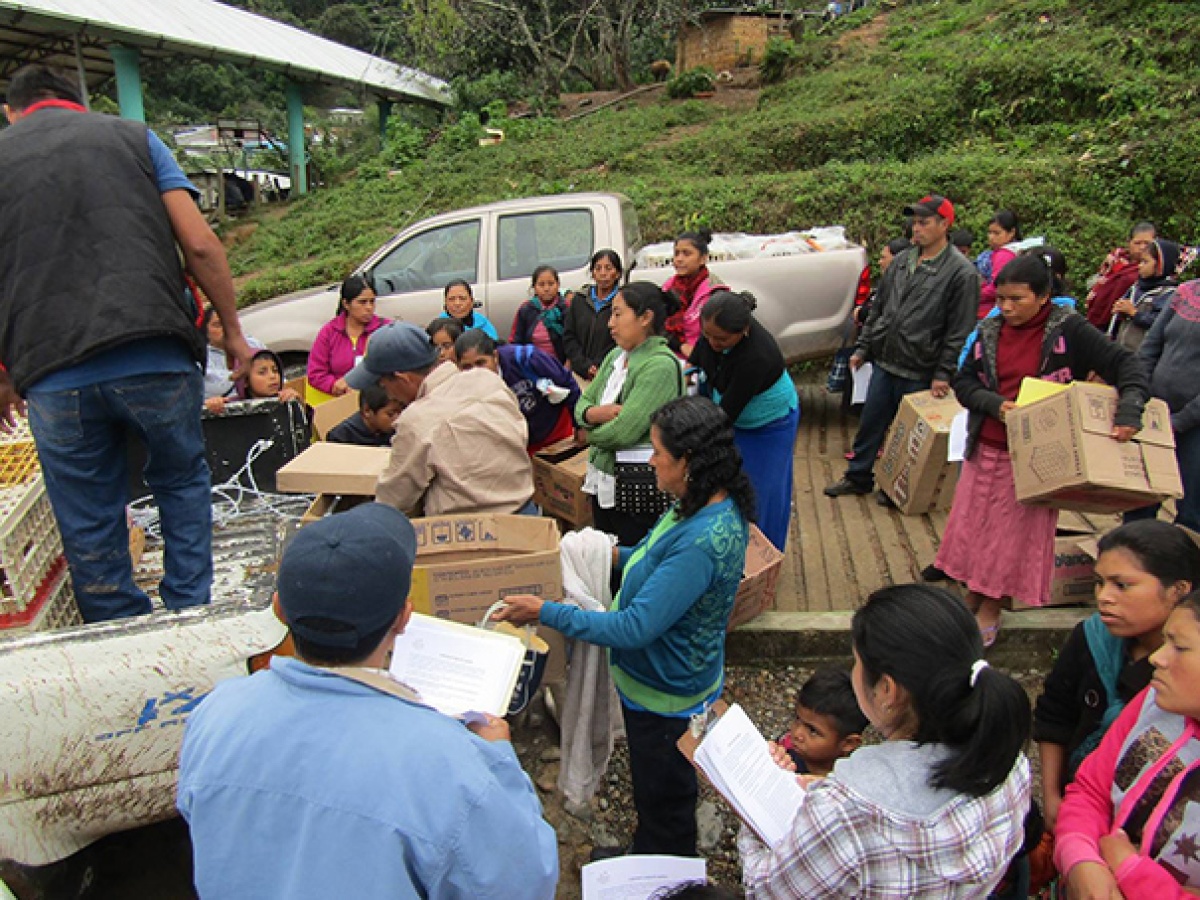10 Hens and Hope in Chiapas
Posted on Mar 8, 2017

Mud-splattered pickups were parked alongside a dirt road in Laguna del Cofre, Chiapas, a small town hugging the Sierra Madres in southern Mexico. Nearby, a group of women and curious children stood holding cardboard boxes. It was a cloudy morning two days after Christmas, and they were receiving a long-awaited gift. It wasn’t toys or clothes, nor candy canes or other sweets, but a package of 10 hens and a rooster.
The birds are more than farm animals to these poor families. They are strutting, squawking bank accounts and edible assets that hold the promise of reversing their childrens' downward slide toward stunting and starvation.
The families received their chickens through a partnership between Compaňeros En Salud, as Partners In Health is known in Mexico, and Heifer International, an Arkansas-based nonprofit focused on ending hunger and poverty through sustainable agriculture and commerce. PIH helped identify families with malnourished children, while Heifer provided the hens whose eggs would add protein and essential calories into the families’ diet.
PIH and Heifer piloted the program in August 2014 with 65 families in Soledad and Matasano, two of the 10 communities in which PIH operates in the rural Sierra Madre of Chiapas. The collaboration was so successful that they decided last year to expand to two other communities: Laguna del Cofre and Salvador Urbina.
“From the data we have, it seems that the community with the biggest problem is Laguna del Cofre,” says Dr. Rodrigo Bazúa, the community program coordinator in Mexico, citing a malnutrition survey PIH conducted in 2015. “Fifty percent of the children were chronically malnourished.” Many showed signs of stunting, meaning their height and weight did not meet global benchmarks for their age.
Chronic malnutrition can affect a child’s entire life.
Children in Salvador Urbina weren’t much better. More than 30 percent showed signs of malnutrition. Sadly, these percentages are typical for the region. Mexico’s 2012 National Health Survey found that 44 percent of children in Chiapas suffer from chronic malnutrition—six times the national average.
Such high numbers ring alarm bells for Bazúa. “Chronic malnutrition can affect a child’s entire life,” he says. Children’s brains grow at a frenetic pace within their first years, from 20 percent to 95 percent full brain development by the time they turn 3. Such rapid change requires proper nutrition.
This knowledge fuels Bazúa and his team’s mission. Their first task was to locate families in each of the two communities who could benefit from “chicken packages.” PIH-supported doctors working in the Laguna del Cofre and Salvador Urbina clinics provided the names of children diagnosed with malnutrition who visited regularly, and added others under 5 who were at risk. Each family was approached about the program and asked if they wanted to participate. In the end, 45 families signed up in Laguna del Cofre, and another 27 in Salvador Urbina.
With that, the PIH and Heifer team got to work. Alejandro Domínguez, Heifer’s regional coordinator, organized efforts from afar, while program manager Gerardo Albores trained PIH community health workers on essential topics such as how to build chicken coops, administer vaccinations, and prepare concentrated feed. Over several months, the CHWs passed these lessons along to families receiving chickens. Once their coops were ready, families picked up their new flocks. The birds are now settling into their new homes and laying eggs, adding protein and calories to the children’s typical diet of rice, beans, and corn tortillas.
Eggs represent something beyond food to these families. Most people in the region are coffee farmers whose profits have been deeply affected by a fungus, called la roya, that has devastated crops for the past three years, leaving families strapped for cash. But ranchos, or farm-fresh eggs, sell for 5 pesos apiece. For a family living on 50 pesos, or $2.75, a day, 10 laying hens represent an entire additional income.
10 laying hens represent an entire additional income
Laguna del Cofre and Salvador Urbina families now wake to the sound of roosting hens and occasionally add a fried egg or two to their meals. PIH community health workers track such changes when they regularly visit families to record what a child has eaten over the past 24 hours, says Francisco Pablo, a nutrition technical supervisor. They also ensure children attend monthly appointments at a clinic PIH supports, where their weight and height is charted over time.
It’s too early to tell if the program has made a difference in Laguna del Cofre and Salvador Urbina. Yet PIH has seen progress in Soledad and Matasano, where the program began. Children whose families received chickens are no longer losing weight, compared to peers outside the program. Those at risk have not slipped into the danger zone.
Families in the nearby community of Buenos Aires are also benefitting from the abundance of hens in Soledad. As flocks have doubled there, families prepared a "chicken package" for their neighbors, who are likewise struggling to provide their growing children with enough protein and calories. "Passing on the gift" is all part of Heifer's long-term goal to multiply the number of children they help rise from the depths of malnutrition in Chiapas.
 |
|
Women from Soledad give some of the chickens they have raised to neighboring families as part of a joint project between Heifer International and PIH in Mexico to reduce malnutrition in the rural communities of the Sierra Madre. Photo by Aaron Levenson / Partners In Health |

